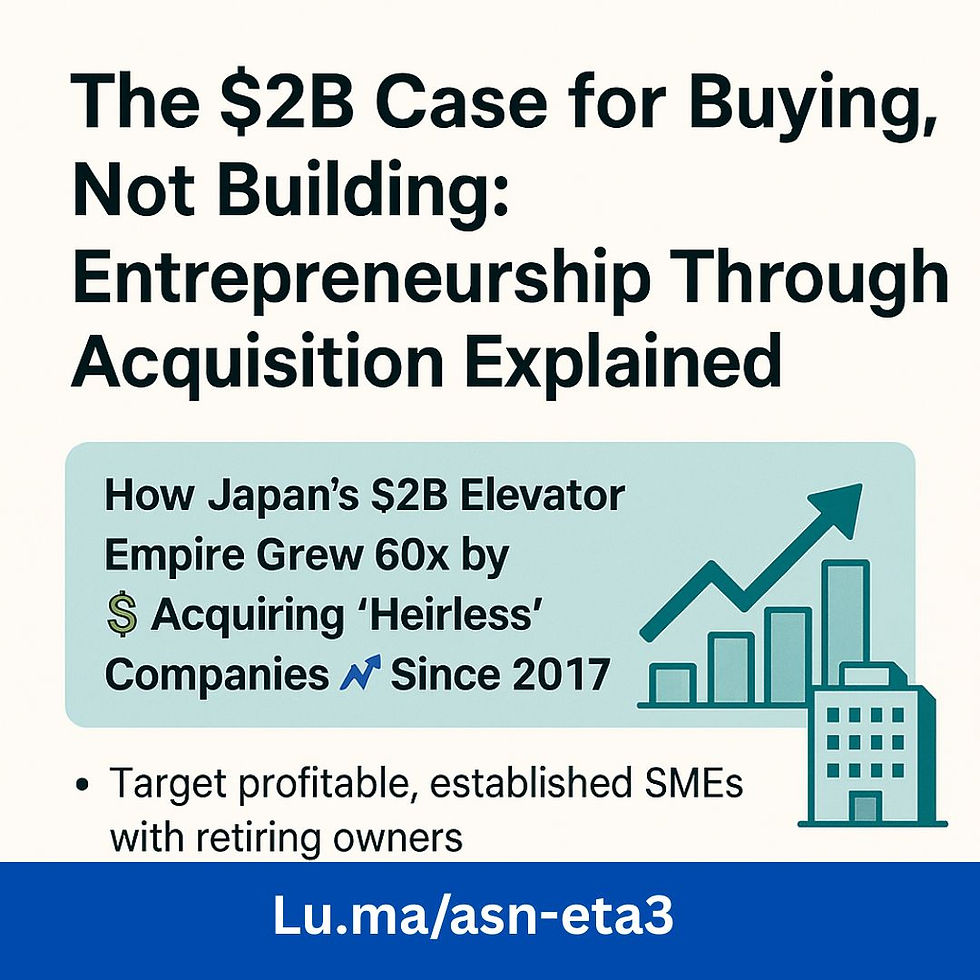Learning #8: Woulda, Coulda, Shoulda: Business, Regret and Long-Term Success
- Andrew

- Feb 4, 2024
- 5 min read

by Roopa Kumar, Founder and Group CEO of Purple Quarter
Ever feel like everyone around you seems to be living life with zero regrets? But here's the truth: regrets are part of the human experience. The good news? They're not just painful reminders of bad decisions, but powerful tools for growth if you know how to use them.
1. Minimizing Regret in Business
People who say they have no regrets are lying. Everyone has regrets, it’s simply part of human nature. Everyone has things they wish they hadn’t done, choices that went the wrong way. Anyone who says they have no regrets is saying that they’ve never made a wrong decision. And we all know that has never happened.
Denying that you have regrets is unhealthy. Not being able or willing to address and process your regrets can damage your life, as it denies you the wisdom you should be gaining from bad experiences. This is especially true in business, where uncertainty can leave you and your company in a bad state. Anyone successful in business must grow, learn, and change. This is where regret can be a valuable asset.
2. Decisions, Decisions, Decisions
Start with a basic question: What is your decision-making process? Pure instinct, or deep study? A split-second, or deep deliberation? These are important questions, because the way you decide is often much more important than what you are deciding. Good, thoughtful decision-making boosts self-awareness and self-esteem, and ups a leader’s potential for resiliency and future growth.
Think about it: Rash, in-the-moment decisions, even if they turn out to be the right ones, are often stressful and anxiety-inducing. Furthermore, because there is no thought process that goes into their creation, no wisdom can be gained from them. You’re not learning if you’re just guessing.
It is easier to understand via the opposite: a decision made after a careful, thoughtful process can, right or wrong, be revisited, interrogated, examined. The same process can be improved and applied to future choices. A brash action is just a brash action, as prone to failure in the future as anything else.
3. Check Your Self
Self-awareness is one of the best assets for good decision-making. Not everyone can see through their own blind spots, but at least being aware of them is valuable. Ask yourself in a plain and frank manner what your own biases are. This is both simple and very hard to do, because it requires owning up to your own failures and shortcomings, but it also creates an avenue for growth.
Sometimes it can be as simple as admitting that you like to play things risky. There is always risk in business, but thoughtful leaders learn to manage and minimize it. Maybe you need to admit your tendency to hire people who are just like you, in terms of education and background. As we shall see, this can lead to creative sterility and group-think, which can harm the long-term innovative potential of a business.
It’s easy to preach but difficult to implement. Here are a few things that helped me develop self-awareness.
● Introspection and Reflection: I started journaling my thoughts, feelings, and experiences without judgment. In retrospect, it helped me identify a pattern of my values, motivations, and biases.
● Feedback and External Perspectives: This might sound ironic, but seeking honest feedback from trusted friends, colleagues, and mentors about strengths, weaknesses, and blind spots reshaped my self awareness.
● Explore and Experiment: Last but not least, stepping outside my comfort zone, trying new things, engaging in unfamiliar activities broadened my perspectives and helped me develop new skills.
Self-awareness is a journey, not a destination. Be patient, embrace the detours, and don't be afraid to get uncomfortable. Celebrate your "mini-regrets" as stepping stones to self-awareness. Every experience, positive or negative, shapes who you are. Embrace the lessons learned and move forward with renewed clarity and confidence.
4. No Yes Men
Volumes of data and numerous studies have found that having a diverse team around you leads to better outcome, short- and long-term. Just as a way to avoid group-think, it makes perfect sense. The best ideas are the ones that can survive questions and doubts, and stand up to contrary notions, but you won’t be able to have those ideas if everyone around you already agrees with you.
Here’s another basic question: Do you even have colleagues that can disagree with you? It is natural for yes-men to crop up in any business, and who doesn’t like being told that they are right? But healthy collaboration requires a certain amount of conflict. Your team must be able to tell you their fears and doubts, and have the power to do so without fear of reprisal.
Most of all, you as the leader must make it clear what your goals are, short- and long-term. That way, conflict or not, everyone will be working toward the same outcome. Uncertainty can lead to infighting and confusion. Do your job as leader, and get everyone on the same page. Then you can argue about how to get there.
5. By the Numbers
In terms of good decisions and avoiding regret, data is worth its weight in gold. But, even with cold hard facts, use caution. Remember those diverse voices with real power from the previous section? Let them look at the numbers with you.
Differing perspectives of budgets, customer info, and sales can solidify the meaning and strategy behind the numbers. Additionally, getting data from different sources for things like market research and future planning can clarify where you should be focusing to shore up the future foundations of your business.
6. Putting It All Together
After all that, now ask yourself about your decision-making process: What are your short- and long-term goals, and how does this choice affect them? What information and data do you have that can inform your decision? What do your trusted colleagues think, what is their perspective?
Now go deeper: What are you not seeing, what are your blind spots? What have you not considered? What level of risk are you facing? What is the best and worst outcome, and can those be changed? After all this, make the best call that you can.
Wrapping Up
Yes, people who have no regrets are lying, but when they say that, what they really mean is that they are happy with how things have turned out for them. They got dumped, only to meet their future spouse. They got fired, only to find their dream job. It is important not to mistake regret for a learning experience. If we learn the meaningful difference between those two things, then maybe we’ll be able to honestly say we have no regrets.
About Roopa Kumar
Roopa Kumar is the Founder and Group CEO of Bespoke CTO search firm, Purple Quarter. An industry veteran, Roopa established the company with the objective of recruiting technology heads for Tech-driven startups and MNCs by maintaining a uni-dimensional focus. At a time when the Indian startup ecosystem was at the cusp of a breakout, Roopa sensed that leadership hiring missed the pulse of a specialized approach.
At Purple Quarter, she has been the brainchild of flagship initiatives like The Tech Factor - A Purple Quarter Podcast (a tech-centric podium where industry leaders converse on cutting-edge technology advancements impacting their respective domains) and the CTO Circle (an exclusive community of tech visionaries to exchange ideas, challenge existing concepts and look for innovative ways of solving tech challenges.)

Connect with her to stay updated with her insights.




Comments